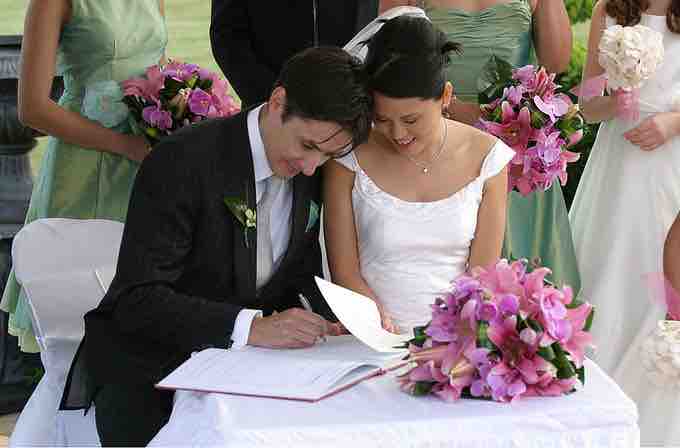Marriage is a social union or legal contract between spouses that creates kinship. The most frequently occurring form of marriage is between a woman and a man, where the feminine term 'wife' and the masculine term 'husband' are generally used to describe the parties of the contract . Other forms of marriage also exist, however. For example polygamy, in which a person takes more than one spouse, exists in many societies. Currently, the legal concept of marriage is expanding to include same-sex marriage in some areas as well.

Bride and groom signing the book
The most frequently occurring form of marriage is between a woman and a man, where the feminine term 'wife' and the masculine term 'husband' are generally used to describe the parties of the contract.
Wedding Ceremony
The reasons people marry vary widely, but usually include the desire to publicly and formally declare their love, to form a single household unit, to legitimize sexual relations and procreation, for social and economic stability, and for the education and nurturing of children. A marriage can be declared by a wedding ceremony, which may be performed either by a religious officiator or through a similar government-sanctioned secular process. The act of marriage creates obligations between the individuals involved, and, in some societies, between the parties' extended families.
Types of Marriage
Outside of the traditional marriage between monogamous heterosexual couples, other forms of marriage exist. Same-sex is marriage between two persons of the same biological sex or gender identity. Supporters of legal recognition for same-sex marriage typically refer to such recognition as marriage equality. It is believed that same-sex unions were celebrated in Ancient Greece and Rome, some regions of China, such as Fujian, and at certain times in ancient European history. In the United States, although same-sex marriages are not recognized federally, same-sex couples can legally marry in six states (Connecticut, Iowa, Massachusetts, New Hampshire, New York, Vermont) and the District of Columbia and receive state-level benefits.
A civil union, also referred to as a civil partnership, is a legally recognized form of partnership similar to marriage. Group marriage is a form of polyamory in which more than two persons form a family unit. All the members of the group marriage are considered to be married to all the other members of the group marriage. All members of the marriage share parental responsibility for any children arising from the marriage. In some jurisdictions, such as Brazil, New Zealand, Uruguay, France and the U.S. states of Hawaii and Illinois, civil unions are also open to opposite-sex couples.
Polygamy and polyandry are two less recognized (or supported) forms of marriage. In polygamy, a man usually takes on a number of different wives, although the literal translation of the term means marriage "between two or more partners". Polyandry is specific to a woman taking on two or more husbands at a time, although it can more loosely mean having multiple sexual partners.
Cohabitation
Marriage is an institution which can join together people's lives in a variety of emotional and economic ways. In many Western cultures, marriage usually leads to the formation of a new household comprising the married couple, with the married couple living together in the same home, often sharing the same bed, but in some other cultures this is not the tradition. Conversely, marriage is not a prerequisite for cohabitation. Cohabitation is an arrangement where two people who are not married live together in an intimate relationship, particularly an emotionally and sexually intimate one, on a long-term or permanent basis.